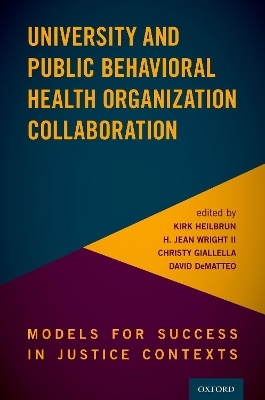
University and Public Behavioral Health Organization Collaboration
Oxford University Press Inc (Verlag)
978-0-19-005285-0 (ISBN)
Public behavioral health organizations serving those involved in the criminal justice system, such as problem-solving courts, correctional facilities, and parole or probation, often lack the necessary resources for long-standing effective treatment, and may struggle to keep up with research standards and retaining funding. To overcome these hurdles, many organizations have turned to university-led collaborations.
University and Public Behavioral Health Organization Collaboration in Justice Contexts begins by introducing the relevant purpose and definitions of such partnerships. Each of the nine contributed chapters that follow features a particular collaboration between a university and a public behavioral health organization. Chapters are structured around a description of the collaboration's purposes, beginning, leadership, who is served, services, operations, effectiveness measurement, and financial arrangements. The descriptions provided of each project are then aggregated into a larger model for success which is detailed in the final chapter, along with a distillation of lessons learned in building, operating, and sustaining a successful collaboration. These lessons are grouped into specific categories: planning, working together, training, consultation, financial considerations, personnel, and research. By considering these nine exemplary projects and what they can teach us about such collaborations, this book constitutes an essential guide for those looking to establish comparable partnerships between universities and public behavioral health organizations in a criminal justice context.
Kirk Heilbrun is currently a Professor in the Department of Psychology at Drexel University, where he served as department head from 1999-2012 and 2014-2016. He is board certified in clinical psychology and in forensic psychology by the American Board of Professional Psychology, and is a Fellow of the American Psychological Association in six divisions. He currently directs a forensic assessment clinic in the Drexel Department of Psychology and the Reentry Project, another Drexel-based project that provides pro bono assessment and treatment services to justice-involved individuals returning to the community from federal prison or under the jurisdiction of the federal mental health court. H. Jean Wright II is Divisional Director, Behavioral Health and Justice Division (BHJD) within the Department of Behavioral Health and Intellectual disAbility Services (DBHIDS), and an Adjunct Professor in the Department of Psychology at Temple University. Dr. Wright previously served as Clinical Director of the Juvenile Justice initiative, within the Philadelphia Behavioral Health System, and was the former Program Director for the city's Mental Health First Aid (MHFA) initiative. He also spends considerable time conducting seminars, workshops, and trainings on a variety of topics related to behavioral health and wellness, public health education, and trauma-informed care, for a diverse group of clientele. Christy Giallella is the Clinical Forensic Manager with Behavioral Health and Justice Related Services of the Philadelphia Department of Behavioral Health and Intellectual disAbility Services. Her work seeks to improve policies and programs for justice-involved individuals with behavioral health challenges. Dr. Giallella earned her PhD in Clinical Psychology from Drexel University. She is a licensed clinical psychologist with a specialization in forensic psychology. Dr. Giallella has worked in a variety of community based and correctional settings with justice-involved adolescents and adults, conducting assessments and providing treatment. Her research background includes juvenile justice, forensic mental health assessment, and public policy. David DeMatteo is a Professor of Psychology and Law at Drexel University, and Director of Drexel's JD/PhD Program in Law and Psychology. His research interests include offender diversion, psychopathic personality, and forensic mental health assessment, and his research has been funded by several federal agencies, state agencies, and private foundations. He is a Fellow of the American Psychological Association (Divisions 12 and 41), a Fellow of the American Academy of Forensic Psychology, and board certified in forensic psychology by the American Board of Professional Psychology. He is also a former President of the American Psychology-Law Society (APA Division 41).
Chapter 1: Introduction
Kirk Heilbrun, H. Jean Wright II, Christy Giallella, David DeMatteo, Kelley Durham, and Claire Lankford
Chapter 2: The University of Virginia's Institute of Law, Psychiatry, and Public Policy
Richard J. Bonnie, Daniel C. Murrie, and Heather Zelle
Chapter 3: The Designated Forensic Professional Program in Massachusetts
Ira K. Packer and Thomas Grisso
Chapter 4: Establishing a Forensic Training Clinic
Mary Alice Conroy
Chapter 5: Ohio's Criminal Justice Coordinating Center of Excellence
Mark R. Munetz, Natalie Bonfine, Ruth H. Simera, and Christopher Nicastro
Chapter 6: University of California, Davis Forensic Psychiatry and California Department of State Hospitals Collaboration: Achieving Mutual Respect and Harmony
Charles Scott, Barbara McDermott, and Katherine Warburton
Chapter 7: Successful Development of Threat Assessment and Management Programming Within a Midwestern University
Mario J. Scalora and Rosa Viñas Racionero
Chapter 8: Using an Academic-Practice Partnership to Develop and Implement an Empirically Informed Approach to Juvenile Probation Case Management in Philadelphia
Naomi E. Goldstein, Jeanne McPhee, Elizabeth Gale-Bentz, and Rena Kreimer
Chapter 9: University-Public Behavioral Health Collaboration: The Florida Mental Health Institute
Kathleen Moore, Joshua T. Barnett, Annette Christy, Marie McPherson, and Melissa Carlson
Chapter 10: The Development of the Centre for Forensic Behavioral Science: A Collaboration between Forensicare and Swinburne University of Technology
James R. P. Ogloff
Chapter 11: Collaboration Between Universities and Public Behavioral Health Organizations: Analysis and Discussion
Kirk Heilbrun, Christy Giallella, H. Jean Wright II, David DeMatteo, Patricia Griffin, Benjamin Locklair, David Ayers, Alisha Desai, and Victoria Pietruszka
| Erscheinungsdatum | 09.03.2021 |
|---|---|
| Verlagsort | New York |
| Sprache | englisch |
| Maße | 231 x 155 mm |
| Gewicht | 340 g |
| Themenwelt | Geisteswissenschaften ► Psychologie |
| Medizin / Pharmazie ► Medizinische Fachgebiete ► Psychiatrie / Psychotherapie | |
| Studium ► Querschnittsbereiche ► Prävention / Gesundheitsförderung | |
| ISBN-10 | 0-19-005285-6 / 0190052856 |
| ISBN-13 | 978-0-19-005285-0 / 9780190052850 |
| Zustand | Neuware |
| Informationen gemäß Produktsicherheitsverordnung (GPSR) | |
| Haben Sie eine Frage zum Produkt? |
aus dem Bereich


